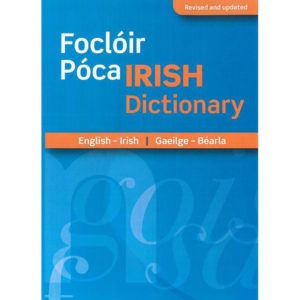Forum Replies Created
-
AuthorPosts
-
Hugo
ParticipantI think it is a good idea to have it written as “Euro” and “Cent” in every country that the currrency is used.
“
It annoys me when people say in English “Euros” or “cents”.Stupid name. Stupid currency. Stupid grammar. Stupid Eurocrats.
Hugo
ParticipantOr is it meant to be genitive – ‘fear ealaíne’ – a man of art, artist (in the more general sense)?
Hugo
ParticipantIn Spanish they do translate ‘hot dog’: ‘perrito caliente’.
‘Try harder’: déan iarracht níos fearr?
Hugo
ParticipantHugo
ParticipantBTW, are these right?
the window had been opened while I was away (and it was open when I came back) = bhí an fhuinneog oscailte fad is nach raibh mé ann (agus bhí sí ar oscailt nuair a tháinig mé ar ais)
the window had been/was opened (=action) –osclaíodh an fhuinneog
the window had been open while I was away, (but it was already shut when I came back) = bhí an fhuinneog ar oscailt fad is nach raibh mé ann (ach bhí sí ar dúnadh nuair a tháinig mé ar ais)
I see no difference between ar oscailt and oscailte in your examples. Where did you get ar dúnadh? I’ve never come across this -just dúnta/druidte.
Hugo
ParticipantBut are the two structures interchangeable in all cases? Is (subject + ar + VN) the same thing as (subject + VA)?GRMA
No. Apart from ar oscailt examples of ar+VN that occur to me off-hand (there may well be many more – and I’ve never got round to buying FGB) are: ar crochadh; ar crith; ar s(h)iúl; ar leathadh.
Depending on context ar crochadh = crochta (VA), and – in fewer contexts, I’d think – ar crith might = crithe (VA) e.g. ar crith leis an fhuacht= crithe ag an fhuacht, though I’d think you’d need the “agent” e.g. fuacht. I haven’t enough Irish yet to know whether ar leathadh = leata (VA) and can’t be arsed to google it. As for ar s(h)iúl (VA siúlta – definitely not.EDIT: Duh! Rinne mé dearmad glan ar ar fáil (VN), which might (in very occasional contexts) = faighte (VA).
Hugo
ParticipantI don’t know if somethings like “Cad chuige”, “tig liom”, “Cad é mar tá tú”, “fosta”, “cluisim”, “druid” are considered “standard” or not.
For “tig liom” I don’t think so, and I guess you meant “cluinim” instead of “cluisim”, but the other are accepted in standard Irish. Standard Irish is a set of grammar and spelling rules, but there’s no standard vocabulary
I thought till quite recently that tig liom was just “Ulster dialectal”, but ‘An Foclóir Beag’ gives, as one of the many idioms with teacht: bheith in ann (ní thig liom sin a dhéanamh). In Nollaig Mac Congail’s ‘Leabhar Gramadaí Gaeilge’, in the section ‘Bealaí chun can, be able a aistriú’, we’re offered, with examples: bheith in ann/bheith ábalta/tig le/is féidir. And I’ve seen it used often enough outwith Ulster-specific contexts. So thiocfadh linn a rá go bhfuil glactha leis sa CO.
Hugo
Participantin is used before vowels and before dhá and bhur.
Hugo
Participantó Bhaile Átha Cliath go Dún na nGall; ó Luan go Déardaoin (ón Luan go dtí an Déardaoin); ó thús go deireadh; ó bhun go barr, etc.
“Go dtí” is used instead of “go” in some situations – e.g. before the definite article.
Hugo
Participant“Chan fhuil” = “Níl” in many parts of Donegal.
Hugo
ParticipantThat evening will be talked of [There will be reference to that evening] “on earth” for ever .
Hugo
ParticipantHugo
ParticipantTuigim, the Northern/Ulster version of “How are you?” isn’t “Go dté mar atá tú” but “Cad é mar atá tú?” (sometimes written “caidé/goidé to reflect its pronunciation). ‘Go dté’ is a different beast altogether: “Go dté tú slán” = “May you go safe(ly) = ‘Vaya/Que vayas con Dios’. Actually, tá mé cinnte go bhfuil sin uilig ar eolas agat agus nach raibh ann ach cineál de “brain fart”… (- :
Hugo
ParticipantI think the usual (non-Hiberno) English version is “She’s 45 if she’s a day”
AuthorPosts
Login
Recent Posts
- Ní thagann ciall roimh aois November 9, 2023
Featured Products
-
 Foclóir Póca (Dictionary)
$18.00
Foclóir Póca (Dictionary)
$18.00